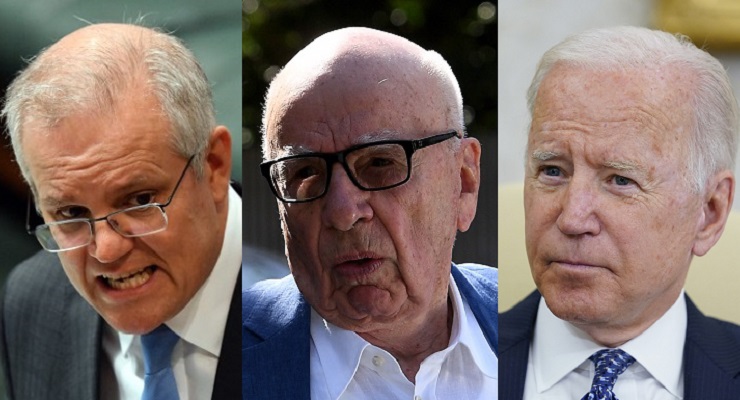
Prime Minister Scott Morrison must have been mighty relieved to read yesterday’s “exclusive” in The Australian that US President Joe Biden was “expected to engage [Morrison] in wide-ranging discussions later this week”.
He’ll be confident too that The Australian will eagerly report these “discussions” as a win for the PM. Sure, it’s the standard Australian media take about Australia’s leaders on the world stage, but right now it’s more important than ever.
Because Morrison has an America problem.
Since September 11, 2001, the Liberal Party has been supplementing — almost supplanting — the diplomatic and military relationship between Australian and US governments with a political relationship between conservative parties.
From Howard’s chuffed acceptance of Bush’s “man of steel” moniker in 2003, through to Morrison’s two-thumbs-up embrace of Trump in 2019, this political relationship has shaped Australia’s approach to everything from the war on terror to climate change.
It’s been nurtured and encouraged by the common media supporter of the Coalition and Republicans — News Corp here and Fox in the US.
Now, through COVID-19 and the Afghanistan evacuations, the PM has been listening, ear cocked at the sounds of silence coming from the Biden White House. But the DC mute button seems stuck — for Australia at least. Abu Dhabi gets a phone call. Even New Zealand gets a nod. All Australia seems to have received is a catch-up as Boris Johnson’s plus-one at the G7.
It’s not the only pre-election bodying that Morrison is getting from the US, with Axios reporting that Facebook intends to further de-emphasise political posts and current events content. It’s driven by the ongoing fight between the tech platform and US regulators, but Australian politicians who’ve relied on Facebook are likely to be caught up.
The 2019 federal poll (death taxes!) may turn out to have been Australia’s last Facebook election.
The parties will still be free to buy ads, but the interaction of Australian electoral law and the platform’s processes makes that a less effective vector for scare campaigns.
Meanwhile, a couple of other Americans are causing even more trouble for Morrison — Rupert and Lachlan Murdoch. The Four Corners two-parter on Fox News’ involvement in Trump’s attempted hijacking of the election is damaging for News Corp, a company whose public standing was already under pressure as a result of its COVID-19 coverage.
A key take away from this weeks’ Essential poll is that the media is the least trusted of public institutions for COVID information (40%, against 68% for state health officials). In those areas News Corp is dominant trust is even lower: 39% in The Courier-Mail’s Queensland, and 32% in the Herald Sun’s Melbourne
News Corp is supposed to help the Liberal government. Looks like it might be providing a dead weight instead.
US-Australia relations are unusually open. As a general principle, polls show that Australians like Americans and Americans like Australians (when they think about us, that is). But the personal links between a president and a prime minister are a carefully curated box, with the actual relationship a Schrodinger’s Cat. Are relations great? Are they terrible?
Hard to tell, because the only journalists listening for sounds of life coming out the box are the Canberra gallery. What the US president thinks about the PM is a big question for Australian politics. But for Washington and the US press corps? Not so much.
The default assumption is that managing the relationship is a must-have for a prime minister (which is why Malcolm Turnbull won points for his deft management of Trump). The hard-headed recognition is that it’s the Australian PM who has to make the relationship work within the priorities set by the president, understanding the limited bandwidth the US leader has to focus on Australia.
Trouble is, Morrison is seen — in both the US Democrat and Australian foreign policy elite — as having brought a bit too much of his footy-fanboy-from-the-Shire schtick to his treatment of Trump.
Worse, the US wants what Morrison doesn’t want to give — a meaningful commitment to the global embrace of climate action.








We are increasingly tired of Rupert Murdoch running the country-kick the evil old sod and his empire out.
Labor’s first priority is exactly that if elected. Plan.Plan.Plan Execute.Execute.Execute. After so many decades end it anyway they can.
The 2019 federal poll (death taxes!) may turn out to have been Australia’s last Facebook election.
Let’s hope so
Murdoch became a U.S citizen because under U.S law a media owner must be a U,S citizen so the first thing an incoming labor government should and must do is change Australia`s media laws to the same as USA laws instead of pandering to him like Hawke, Keating and Rudd did.
Sorry, Moloch snr got his Oz citizenship back in one of the Rodent’s first legislative changes and Lachy, the Clown Prince is Oz by birthright.
So we had a troika of lunatics running our countries. The US got rid of theirs. Unfortunately Australia and the UK still have theirs.
Morrison’s yahooing at the Midwest Trump election rally, and general sucking up to him probably contributed 90% to Biden thinking he’s a mug. Climate change attitude confirmed it. It’ll be a frosty Friday before he gets the time of day from the USA again.